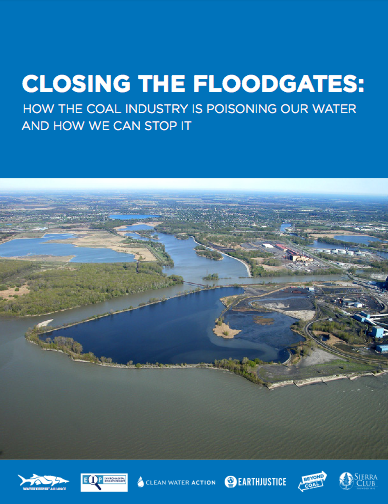Why is the White House aiding and abetting lawbreaking by coal plants?

A new report documents widespread lawbreaking among the nation's coal-power utilities that endangers public health -- and it reveals an effort by the White House to let them continue skirting the law.
The report, titled "Closing the Floodgates: How the Coal Industry Is Poisoning Our Water and How We Can Stop It," was released this week by Waterkeeper Alliance, Environmental Integrity Project, Clean Water Action, Earthjustice, Beyond Coal and the Sierra Club. It comes as the Environmental Protection Agency is collecting public comments on proposals to limit how much pollution coal-fired power plants can discharge to rivers, lakes and other surface waters under the federal Clean Water Act.
"Our review of 386 coal-fired power plants across the country demonstrates that the Clean Water Act has been almost universally ignored by power companies and permitting agencies," the report states.
Of the 274 coal plants found to be discharging into waterways either coal ash or wastewater from air pollution devices known as "scrubbers," 188 operate with no limits on the toxics most commonly found in such discharges, including arsenic, boron, cadmium, lead, mercury and selenium, in violation of the Clean Water Act. These pollutants are known to cause cancer and/or brain damage.
Of the 108 permits examined for coal plants in the 13 Southern states, the report found that only 40 set any limits on pollutants. Of the 20 permits examined for coal plants in Kentucky, none set limits. Ditto for the eight permits examined in Georgia, the seven in Virginia, the four in Arkansas, and the three in Mississippi.
The report's other findings:
* Nearly half of the coal plants surveyed, 187, are operating with expired Clean Water Act permits.
* Of those 187 plants, 53 are operating with permits that expired at least five years ago.
* Of the 274 discharging plants, 102 have no requirements to monitor or report discharges of toxic pollutants to government agencies or the public.
* A total of 71 coal plants surveyed discharge toxic pollution into rivers, lakes, streams and bays that have already been designated as impaired due to poor water quality, and three out of four of these plants have no permits limiting the amount of toxic metals they can dump.
"Allowing coal polluters to fill our rivers and lakes with this witches' brew of toxic chemicals threatens public health and diminishes quality of life for Americans," said Waterkeeper Alliance President Robert F. Kennedy Jr. "The Clean Water Act is one of our nation's greatest achievements, but 40 years after this critical legislation was passed, the coal industry is still polluting with impunity, thanks to a loophole no other industry has enjoyed."
Existing regulatory standards for coal plant wastewater under the Clean Water Act were created in 1982 and don't cover most of the worst pollutants. While the EPA has acknowledged the guidelines are inadequate, it has repeatedly failed to set stricter standards -- and now its latest efforts are at risk of being foiled by political interference from the White House.
The report's authors reviewed a copy of the EPA's proposed coal plant water pollution standards that were sent to the White House Office of Management and Budget before they were released for public review. It shows OMB gave in to industry pressure and inserted weaker regulatory options into the draft rule prepared by EPA that Kennedy said would essentially allow the industry to continue with "business as usual." To view a copy of the document with the OMB changes marked, click here.
"EPA sent over a strong rule to OMB that proposed affordable treatment solutions for a serious water pollution problem. But after closed-door meetings with industry, OMB decided to overrule the experts at EPA and propose so-called 'preferred' options that will give coal plants a free pass to continue dumping toxics into our waterways," said Abigail Dillen of Earthjustice. "It's outrageous that OMB is caving to coal interests instead of getting arsenic and other poisons out of our drinking water.”
Electric utilities exercise considerable political clout. Last year alone they spent over $145 million on federal lobbying efforts, according to the Center for Responsive Politics' OpenSecrets.org database. In the 2012 election cycle they contributed over $22 million to the campaigns of federal candidates, including over $663,000 to President Obama's re-election campaign.
Among the utilities singled out in the report is North Carolina-based Duke Energy, whose coal plant water discharges are seriously damaging three of the state's rivers: the Catawba, the French Broad, and the Cape Fear. It also discusses the damage that Alabama Power coal plant discharges are doing to the Black Warrior River in Alabama, and it examines the Tennessee Valley Authority's continued use of risky coal ash ponds despite the 2008 coal ash spill disaster at its Kingston plant in eastern Tennessee.
The environmental groups behind the report are calling on EPA to adopt what's called "Option 5" in the draft rule. The strongest regulatory option, it would eliminate almost all toxic discharges to waterways from coal plants and cut pollution by more than 5 billion pounds a year. The second-strongest alternative, Option 4, would also reduce pollution but by 2 billion pounds less than Option 5.
Coal-fired power plants are a major source of water pollution in the United States, dumping more toxics into the nation's waters than the other top nine polluting industries combined. The metals they discharge into ecosystems do not degrade over time and build up in fish and the animals and people who eat them. A recent study found that 84 percent of fish in the United States contain unsafe levels of mercury, a potent neurotoxin.
"Americans are being injured by this," Kennedy said. "Environmental crime is real crime."
Tags
Sue Sturgis
Sue is the former editorial director of Facing South and the Institute for Southern Studies.
